
A hairdresser helps people enhance their appearance through hairstyling and grooming. This job requires technical skills, an eye for aesthetics, and good communication abilities to understand clients' needs. While some people enjoy working with hair and helping others feel confident, others may find the long hours on their feet and the need for continuous skill improvement challenging. Are you suited to be a hairdresser? Take this quiz to find out.
A hairdresser is a professional who cuts, colors, and styles clients’ hair. Their job is not just about technique—it’s also about enhancing a client’s natural beauty and ensuring their satisfaction. To succeed, hairdressers need strong communication skills and an awareness of the latest trends.
The job involves using various tools, which require proper handling and hygiene management. While many hairdressers work in salons, opportunities also exist in industries like bridal services and fashion. In recent years, more hairdressers have chosen to work as freelancers, allowing them to expand their careers and showcase their unique skills.
To thrive in this profession, continuous skill development and adaptability to new trends are essential. In addition to hairstyling, hairdressers must have knowledge of scalp care and hair care products. Providing personalized advice based on a client’s hair type and concerns is key to building trust.
Furthermore, social media has become a crucial tool in the beauty industry. Hairdressers who effectively promote themselves online can attract more clients and strengthen their personal brand.
A hairdresser’s job goes beyond just cutting hair. In addition to fundamental skills like cutting, coloring, and perming, hairdressers can also specialize in bridal hair and makeup, styling for photoshoots, or even wig-making. While working in a salon is common, more hairdressers are now choosing to become freelancers or pursue careers abroad.
Some use their hair and makeup skills to work behind the scenes at fashion shows or on film sets. With experience, hairdressers can advance to managerial roles, become salon owners, or even start their own businesses.
Additionally, some hairdressers expand their expertise into areas like head spas and aesthetic treatments, broadening their career opportunities. The rise of online beauty consultations has also introduced new ways for hairdressers to connect with clients, making the profession more diverse than ever before.
To become a hair stylist in the United States, the first step is to attend a state-approved cosmetology school, where you’ll learn essential skills such as haircutting, coloring, styling, and sanitation practices. After completing the required hours of training, you must pass both written and practical exams to obtain a cosmetology license, which is required to work legally in most states.
Once licensed, many aspiring stylists begin their careers as assistants or junior stylists in salons, gaining hands-on experience and improving their skills on the job. Over time, they may become independent stylists, go freelance, or even work internationally. There are many career paths within the beauty industry, including opportunities to specialize or move into education, product development, or brand representation.
The beauty industry is fast-changing, with new trends and techniques emerging all the time. That’s why continuing education through workshops, seminars, and advanced training is important for staying competitive and refining your craft.
In addition to technical skills, learning about business and marketing can open the door to salon ownership and long-term success. Many stylists choose to open their own salons and become entrepreneurs. Today, building a strong presence on social media platforms like Instagram or TikTok is also a key part of promoting your services, developing your personal brand, and attracting new clients.
Ultimately, success as a hair stylist doesn’t rely on technical ability alone—it also depends on customer service, communication, business sense, and personal branding. A well-rounded skill set is essential to thrive in this dynamic and rewarding field.